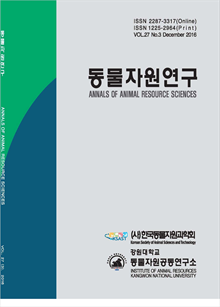간행물
동물자원연구 KCI 등재 Annals of Animal Resources Sciences

- 발행기관 강원대학교 동물자원공동연구소
- 자료유형 학술지
- 간기 계간
- ISSN 1225-2964 (Print)2287-3317 (Online)
- 수록기간 1990 ~ 2025
- 주제분류 농수해양 > 축산학 농수해양 분류의 다른 간행물
- 십진분류KDC 527DDC 636
권호리스트/논문검색
제17권 (2006년 12월) 18건
1.
2006.12
구독 인증기관 무료, 개인회원 유료
We investigated the effect of different kinds of dietary added fat on the fatty acid composition, cholesterol content and quality of hens‘ eggs. The Haugh units, breaking strength, shell thickness and yolk color were not significant difference among the groups. Dietary fat notably altered the polyunsaturated fatty acid composition and cholesterol content in the egg yolk. The n-6 fatty acid of egg yolk was highest in the corn oil fed group with 31.61%, and this tended to decrease in the order of the tallow, linseed oil and fish oil fed groups(p<0.05). The n-3 fatty acid of egg yolk tended to increase in the linseed oil and fish oil fed groups as 9.74% and 5.16%, respectively(p<0.05). Theses alterations in the yolk fatty acid composition resulted in a reduced cholesterol content of the eggs. The ranges of cholesterol content showed values of 15.98-18.37 mg/g of yolk or 227-261 mg/60g of egg, respectively(p<0.05). The cholesterol content of egg yolk was highest in the tallow fed group, and this tended to be reduced in the order of the fish oil, linseed oil and corn oil fed groups(p<0.05). The reduction of the egg yolk cholesterol content in the other groups compared to the tallow group was significantly different, i.e., 13.01% in the fish oil group, 11.49% in the linseed oil group and 6.91% in the corn oil group, respectively(p<0.05). This result suggests that it is possible to reduce the cholesterol content or to increase the n-6 and n-3 polyunsaturated fatty acids in eggs by manipulation of the dietary added fats.
4,000원
2.
2006.12
구독 인증기관 무료, 개인회원 유료
4,200원
3.
2006.12
구독 인증기관 무료, 개인회원 유료
4,000원
4.
2006.12
구독 인증기관 무료, 개인회원 유료
4,000원
5.
2006.12
구독 인증기관 무료, 개인회원 유료
4,000원
6.
2006.12
구독 인증기관 무료, 개인회원 유료
4,200원
7.
2006.12
구독 인증기관 무료, 개인회원 유료
4,200원
8.
2006.12
구독 인증기관 무료, 개인회원 유료
4,200원
9.
2006.12
구독 인증기관 무료, 개인회원 유료
4,800원
10.
2006.12
구독 인증기관 무료, 개인회원 유료
4,000원
11.
2006.12
구독 인증기관 무료, 개인회원 유료
4,000원
12.
2006.12
구독 인증기관 무료, 개인회원 유료
4,500원
13.
2006.12
구독 인증기관 무료, 개인회원 유료
4,200원
14.
2006.12
구독 인증기관 무료, 개인회원 유료
4,000원
15.
2006.12
구독 인증기관 무료, 개인회원 유료
4,000원
16.
2006.12
구독 인증기관 무료, 개인회원 유료
4,000원
17.
2006.12
구독 인증기관 무료, 개인회원 유료
4,300원
18.
2006.12
구독 인증기관 무료, 개인회원 유료
4,200원

